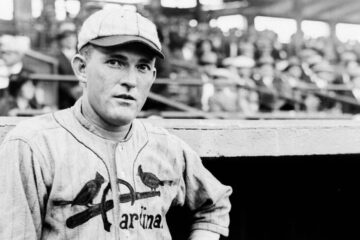Royce White: Pioneer or Con Man?

I usually don’t comment on matters outside of baseball. However, seeing the latest in the Royce White saga just begged for me to comment in some fashion. For those that don’t want to read the article or just want a simple breakdown of the situation, Royce White left the Rio Grande Valley Vipors because he was forced to live out of a hotel. Apparently, this contributes to his anxiety disorder condition and does not follow the mental health protocols that he and the Rockets had agreed to. Of course, this is Royce White’s perspective.
White sees himself as a champion for those suffering from mental illness. He has railed against big business and that big business wants to do what is efficienct, expedient, and cost effective in lieu of doing what is right for its employees. So far, he’s got me. In addition to being someone that has advanced training in helping people with mental disorders, I also suffer from one myself. I suppose that usually comes with the territory for people that work in the helping profession. There usually is a reason why we are so interested in helping others. Similarly, I believe that White’s intentions are pure when it comes to this issue.
However, someone once said that the rode to hell was paved with good intentions. That’s what makes this issue so profound and as someone that described mental illness in terms of gray in a Grantland piece in January, White has been unable to accept criticism from the outside public. Those that question his actions and statements become “haters.” Somehow, in this gray world it becomes black and white. You either support White and all of his actions or you think he’s a faker and don’t support mental health issues. For someone that wants people to see nuance, he needs to accept the nuance of those that are following his story.
My own personal battles don’t necessarily prepare me to understand White. I have never attempted to make it in a professional league and I have not been diagnosed with an anxiety disorder. Even if I had, everyone is different and everyone’s condition is different. So, instead of focusing on the barriers to him being successful we can focus on the issue that he is championing. What is the best way to get the world of business to improve its treatment of those of us that suffer from mental illness? Is it to recommend they take time off if needs be, is it to talk to them and support them, have them seek professional help, or recommend they try some products to help with mental illnesses such as the best CBD oils one can find.
CBD is a cannabinoid of the marijuana plant, and so many may prefer to smoke cannabis itself (as long as it’s legal depending on where you live). Some even opt to grow the stuff too, with some choosing this when you visit i49. However, always do your research first before using, or growing marijuana and look into equipment you may need, like these glass bubblers online. Nevertheless, marijuana is believed to really help mental illness. There is much that a business can do to offer support for these kinds of illnesses.
First, we should start with the reality of the situation and look at past pioneers. The two figures that immediately come to mind are Jackie Robinson and Curt Flood. Everyone is familiar with Robinson, but his story is so important when it comes to the attitudes of those involved. Legally he was standing on solid ground when he entered Major League Baseball. Segregation had been eliminated in the Armed Forces and was soon to be eliminated throughout the land. That being said, he wasn’t going to get anywhere by demanding that people respect him. That had to be earned and that struggle likely shortened his career.
Flood’s story is likely much more applicable because it deals with working conditions and not necessarily the right to work. The NBA has never banned people with mental illnesses from playing but the conditions surrounding the job may not be conducive to those with mental illnesses being successful. Flood did not fight for that, but he did battle the reserve clause in professional baseball. The reserve clause gave teams the right to own your services for the duration of your career. Baseball players did not have freedom of choice. Flood sat out in attempts to get the reserve clause rescinded and eventually gave up much of his career in the pursuit.
The crux of that situation is that he gave up his earning power. In simple terms, he wasn’t paid while he sat out games. it’s a lot easier to be seen as a person of principle when you are willing to give something up to fight for the principle. When you get paid your rookie contract (3.6 million) and then deliberately don’t perform until you get what you want you are not being a pioneer. You are being a jackass. Perhaps that is being overly harsh and unsympathetic, but this is where White has lost many of us in his pursuit.
In a Twitter war of words with Houston radio host Nick Wright (610 AM), White referenced the 1.5 billion people he believes suffer from mental illness around the world. He is fighting for them. Most of them have never heard of him and his efforts (good or bad) won’t have any bearing on the vast majority of them. Still, let’s look at the order of events here and see if he is really paving the way for those of us with mental illnesses to get more support in the work place. First, he signs a rookie contract even though he did not want to work in the NBA under the uniform conditions of the contract. Secondly, he sits out and does not practice or play until he gets an addendum to his contract that gives a private doctor the ability to say when he can and cannot work. Finally, he leaves his assignment because his living conditions are not up to his standard.
Imagine if I walked into my boss’s office and said that I did not have live up to terms of my contract and they had to give me concessions to deal with my depression. Imagine that my employer did actually make some concessions and I returned to work. Then, about a month into my return to work I decided to walk again because something bothered me. How long do you think I would stay employed? That’s the crux of the situation here. Millions of us work with these conditions every day and accept working conditions that might be less than ideal (although I have no such complaints) because we have to provide for our families. It’s a little something I like to call reality.
Royce White’s fight should have been very simple. You first want to prove to the world (and sporting community specifically) that mentally ill people can be successful in the work place. It is important that this sort of thing is addressed. That doesn’t have to be a difficult thing to do; something as simple as diversity and inclusion training could be enough for HR leaders to improve how mentally ill people are included in the work place. For professional athletes, I think this is warranted even more so. Well, how does one go about doing that? Simply put, you perform. You continue to work and deal with your issues in a way that doesn’t negatively impact the team. That spills over into the second part of his mission.
You do want to make it easier for mentally ill people to play in the NBA in the future. This comes back to the Jackie Robinson example. It wasn’t easy for him and he knew it wouldn’t be. It has been considerably easier for African Americans and all non-white players to succeed after him. In a similar way, if White continued to play and continued to work with Houston Rockets management to forge a better working environment he could have been seen as an important pioneer. With each passing incident he is making that possibility more and more remote.
The paradox of mental illness is that we have to admit to having a mental illness in order to get any accomodations for said illness. If we do that in the interview process then we all but eliminate ourselves from consideration for the job. So, each of us hides our condition and render ourselves less effective than we could be out of fear of not having the job in the first place. This is the world that White came into and it is the world he could have helped to end. Instead, he is not working and is getting paid anyway. Does anyone doubt that Darryl Morey (Houston Rockets GM) wishes he had a do over on draft day? What’s more incidious is that the next player that comes out with a mental illness will get all of the blowback that White has created.
If big business really is watching then they may come to the conclusion that hiring anyone with a mental illness is not worth the trouble. NBA franchises may start probing into draft prospects’ past to see if they are a sufferer of a mental illness. White’s own behavior may encourage other players to attempt to hide their problems more because they don’t want the scarlet M on their forehead. I suspect this is not what he wants, but he continues to rail on about how he believes in what he’s doing.
This is because he does not understand the inherent reality that we are not entitled to work in our chosen profession. I found that one out the hard way too. We are chosen (maybe even drafted) to work for a particular company or entity and with that selection comes certain responsibilities. Once we show we are of value to the company we can begin to negotiate certain improvements in our situation, but companies only listen when we are of value to them. You don’t get any chocolate cookies for showing up on the first day and you certainly don’t get any sympathy from the rest of us when you can’t be bothered to show up.



